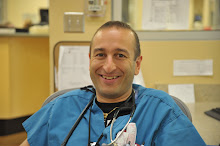När man bläddrar runt på nätet hittar man läkares olika mödor att introducera akutläkare som egen specialitet, hittade detta från Tyskland, se nedan. Känns argumentationen igen??? ; )
Report from Germany – Status October 2009
DGINA’s work in the past year was dominated by our application for Germany to recognise emergency medicine as a specialty.
We are facing strong opposition from other medical societies – but with no arguments being given against the specialty except that other societies do not want change. We have rejected the proposal for a supra-specialty. We believe this is only a delaying tactic: If the supra- specialty was introduced it would take the specialty itself off the agenda in Germany for many years.
DGINA presented a formal request for the emergency specialty physician to the German national medical council in April 2008.
The European core curriculum was also adopted to German conditions as the training curriculum and also submitted to the national medical council. The German national medical council had said it would make a vote on the application in May 2009.
But other German medical societies are in the passive-resistance phase, using all opportunities for delaying tactics. The debate was suddenly postponed at the last minute to 2010.
The societies representing surgeons, internal medicine and anesthetists say they will make a joint position statement about the speciality through the society DIVI.
DIVI is a joint society for all societies involved in German intensive care medicine. All the DIVI societies are against the specialty and against DGINA.
But we have achieved quite an important victory. DGINA has succeeded in becoming an associate member of DIVI.
This was a victory as it gives DGINA the chance to voice the arguments FOR the new emergency specialty when the DIVI members are making their recommendation.
The next step is getting in contact with BAND, the association of pre-hospital emergency medicine, to see where there is common ground and where there is a need for further negotiations. DGINA will make efforts to persuade BAND to end its opposition to introduction of the specialty physician for emergency medicine in Germany.
All members of the DGINA executive board have been making speeches about the new emergency speciality at congresses organised by the other societies and taking part in podium discussions to this theme.
With strong resistance from other medical societies we moved to argue our case in other areas. We have started talks with the Federal German Health Ministry in Berlin – and found support there. We have held talks with the association of health insurance providers and with the association of hospital operators and also found support. We have also held talks with the German army, which needs specialty emergency consultants for its growing operations overseas.
To sum up: a look at who supports introduction of the emergency medicine specialty in Germany:
- The political level - Hospital operators because of economic pressure - The rest of Europe via EuSEM - Doctors actually working in emergency departments
Who is against the specialty? Other medical societies not involved in emergency departments.
I believe Germany will introduce the speciality but this will be a long journey. DGINA’s annual congress in Weimar in October 2009 has the fitting theme “The journey is the goal.”
And finally: We have made considerable progress with our plans for introducing quality certification for emergency departments in Germany. DGINA’s new quality certification system, called DGINA Zert® will be launched during our Weimar congress. We believe this certification system has a huge potential and there is already major interest from hospitals.
Dr. Barbara Hogan, The President DGINA
söndag 27 december 2009
Prenumerera på:
Kommentarer till inlägget (Atom)




Inga kommentarer:
Skicka en kommentar